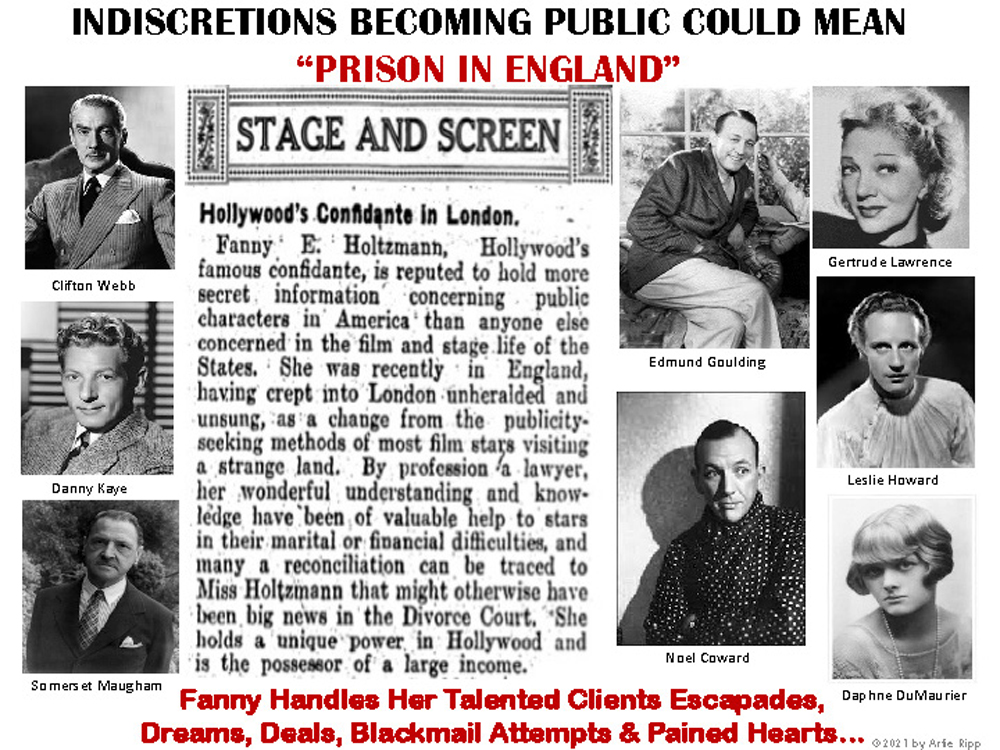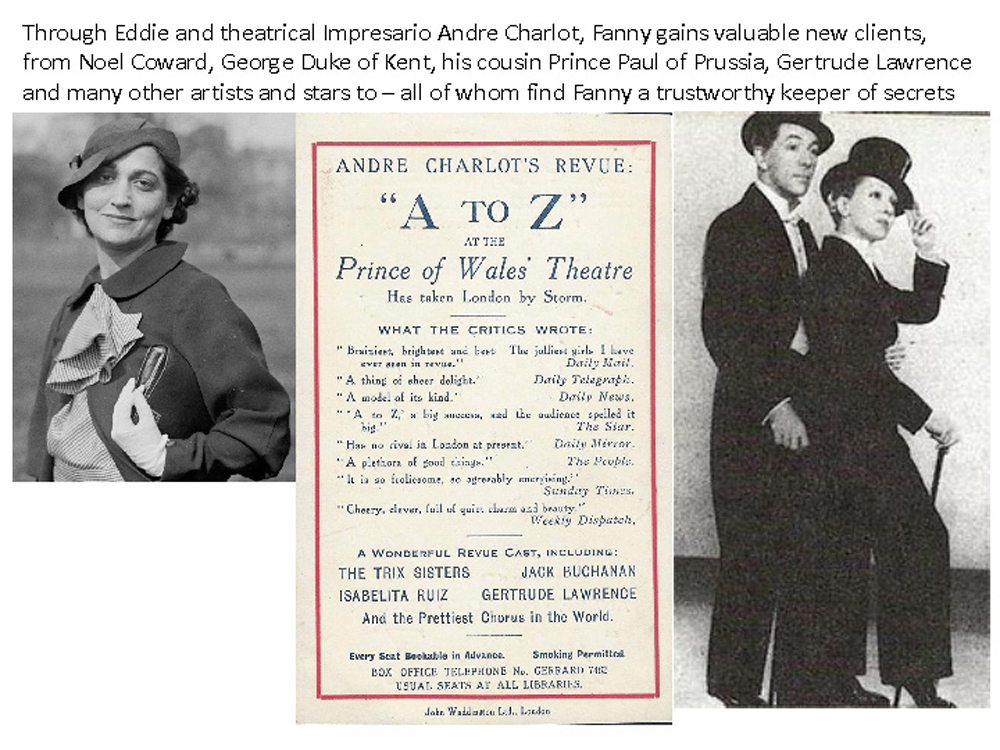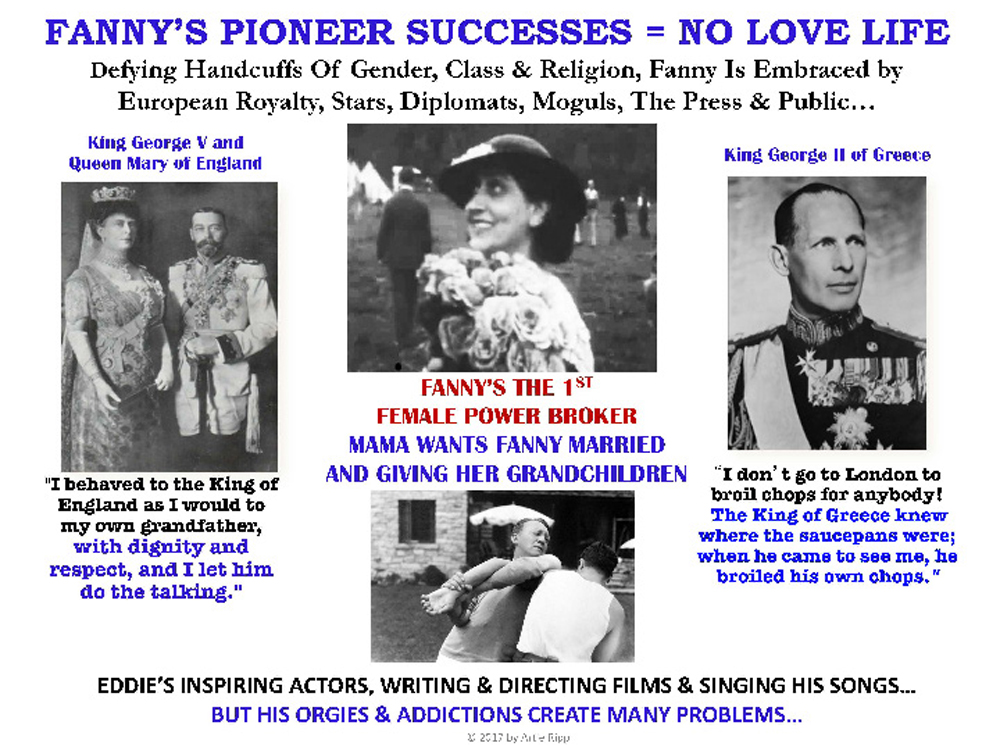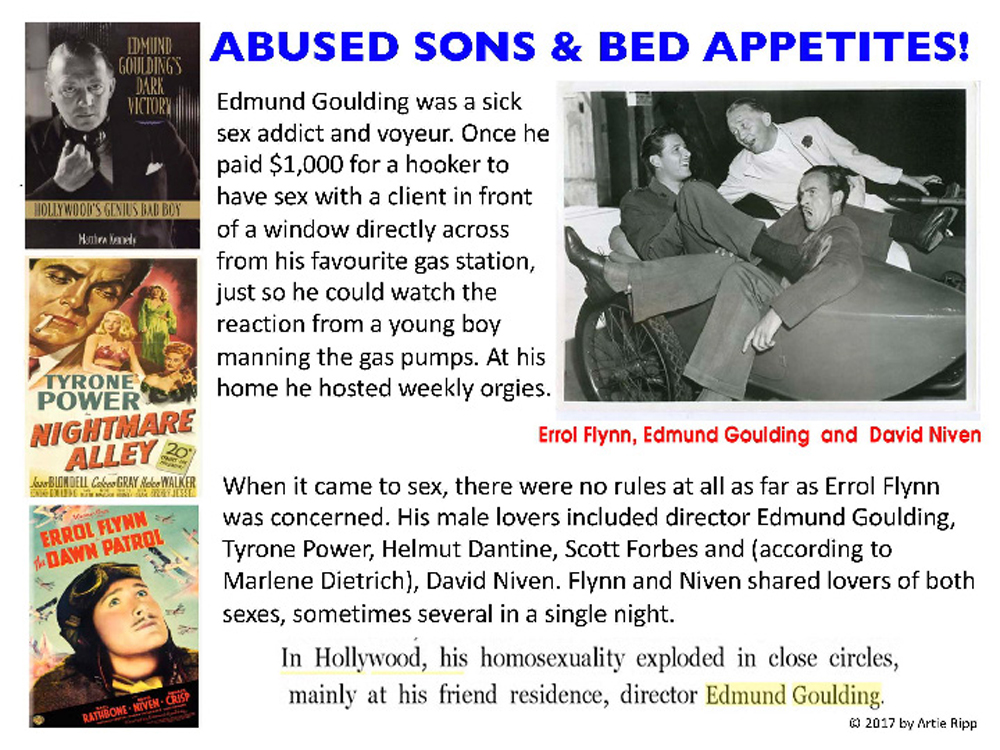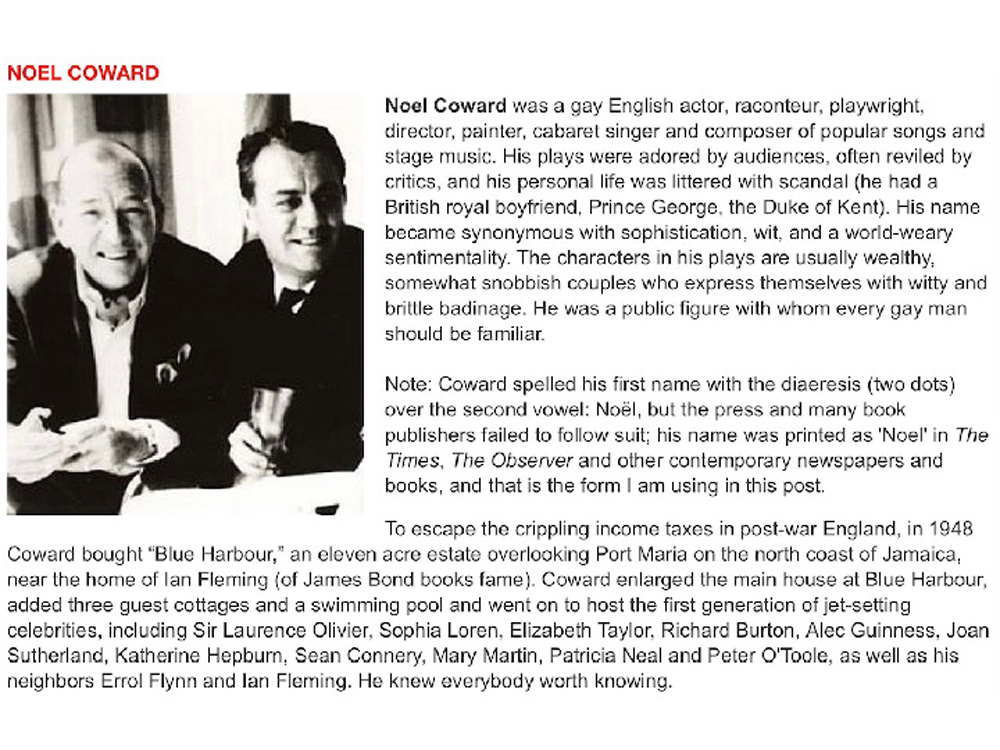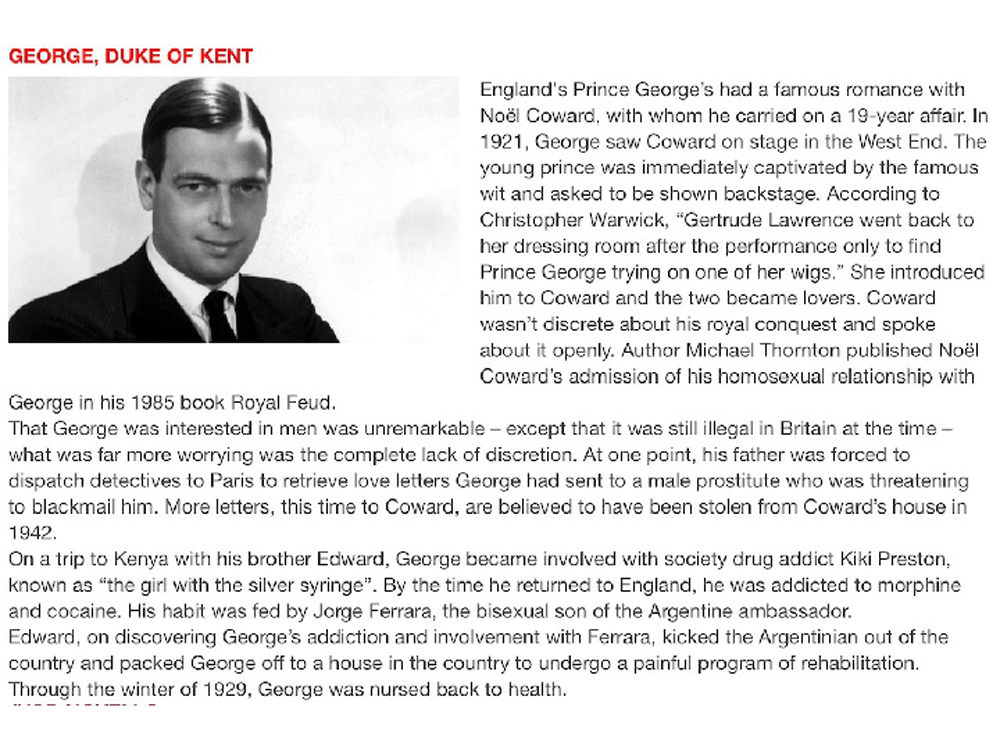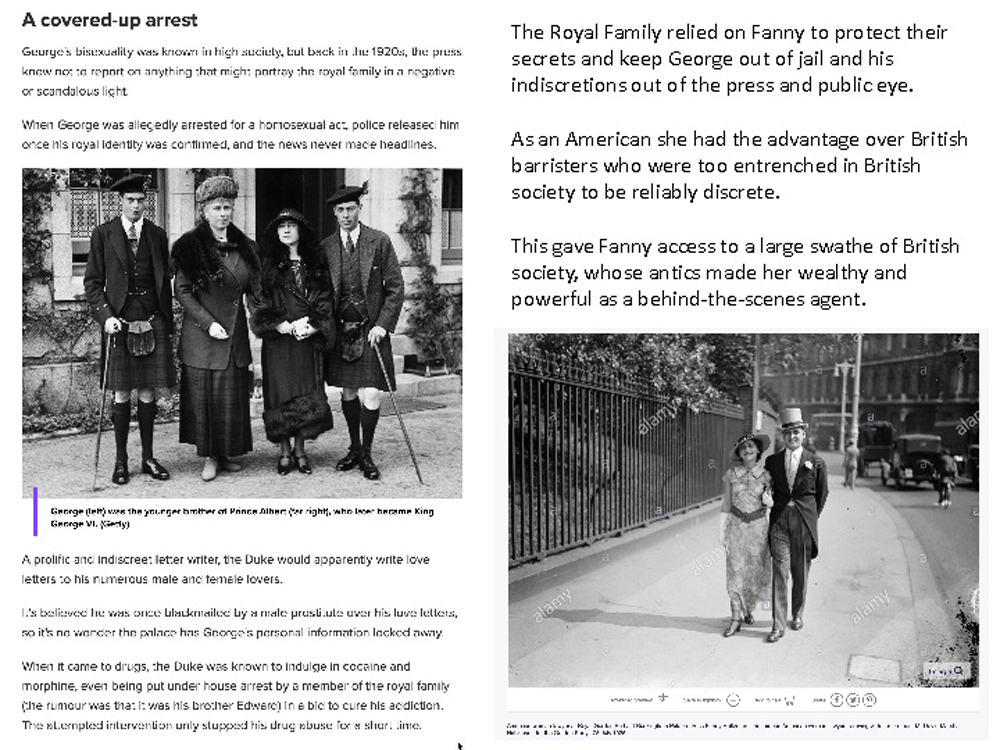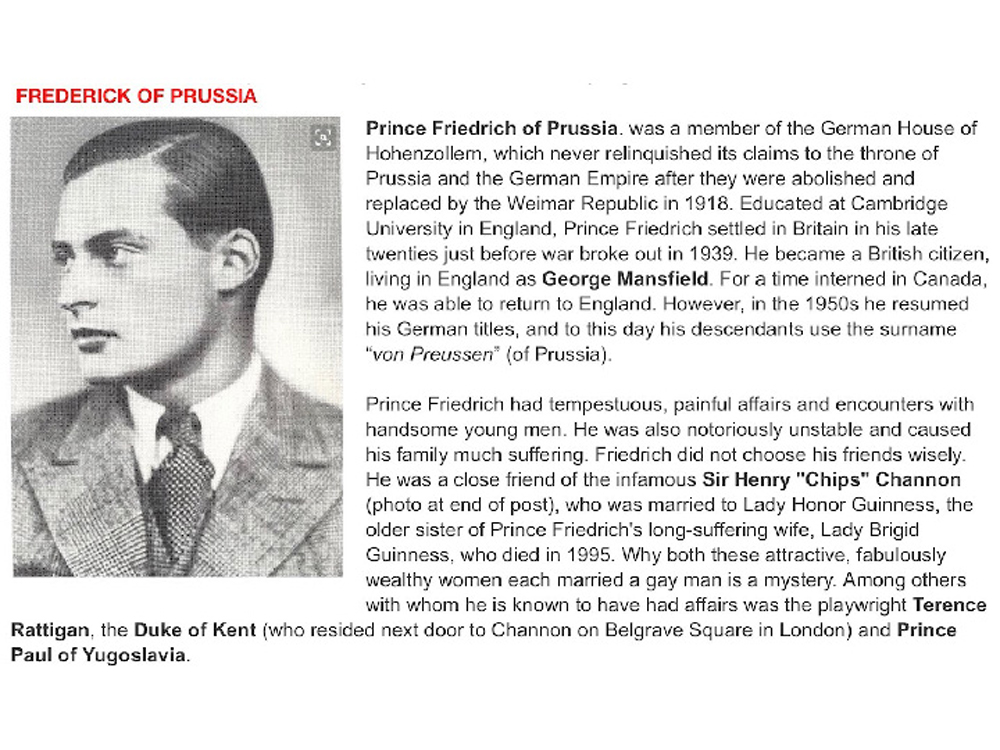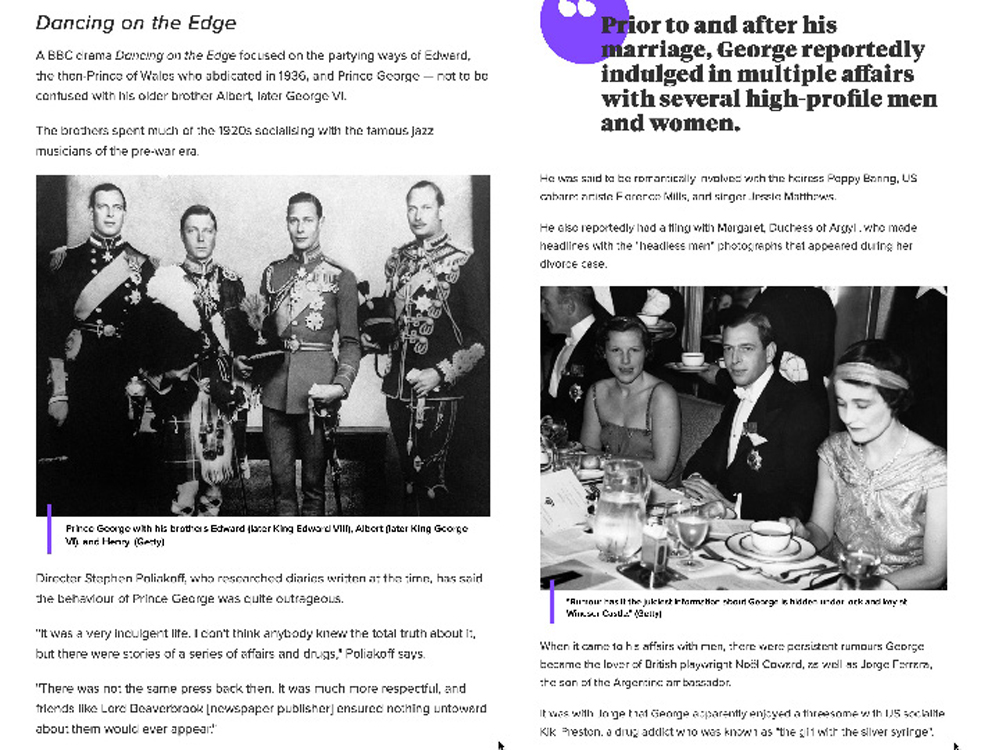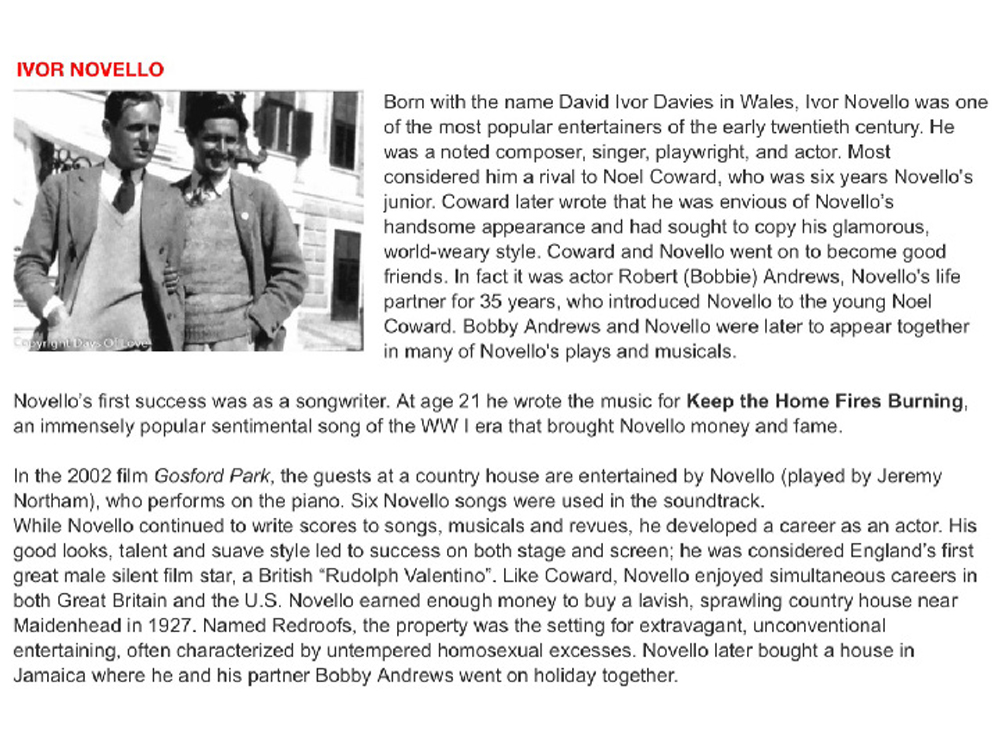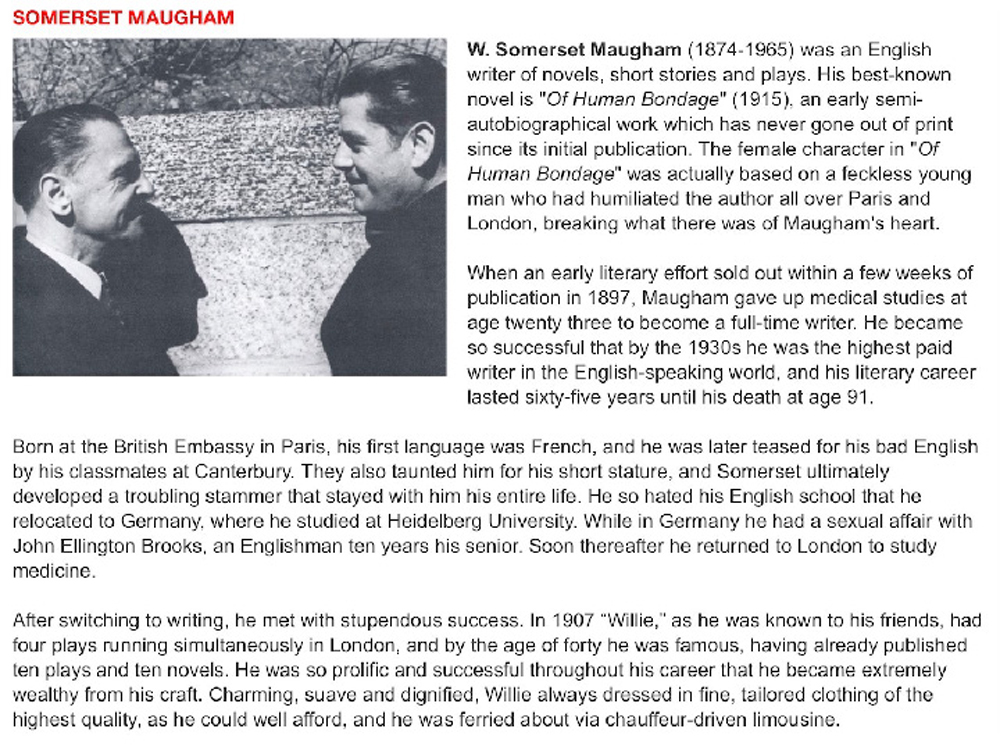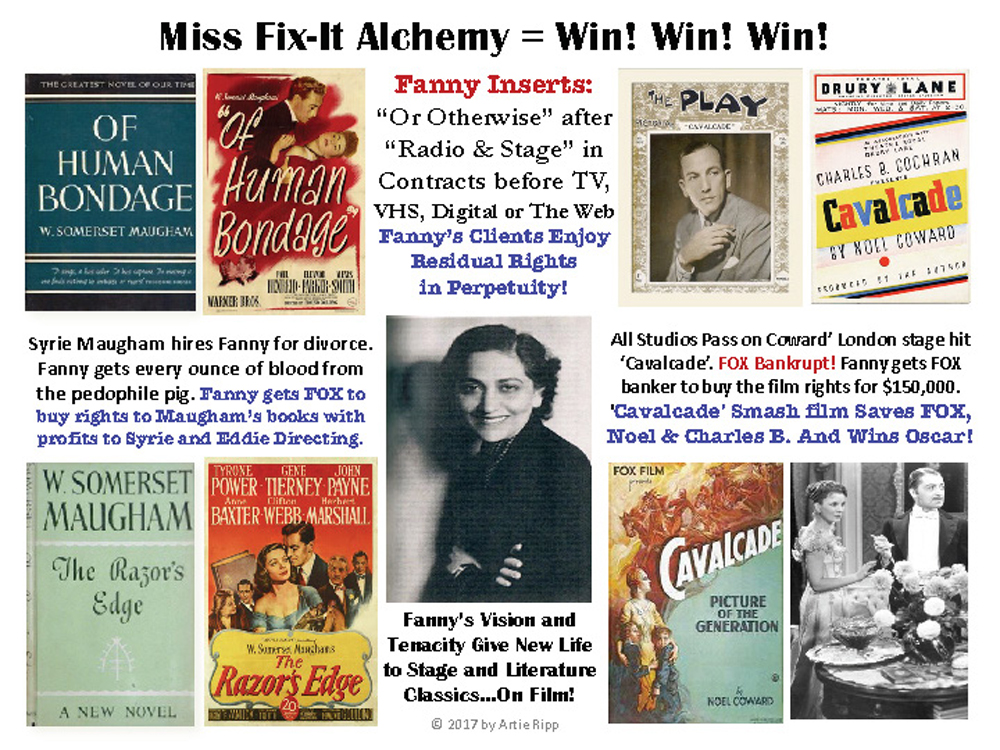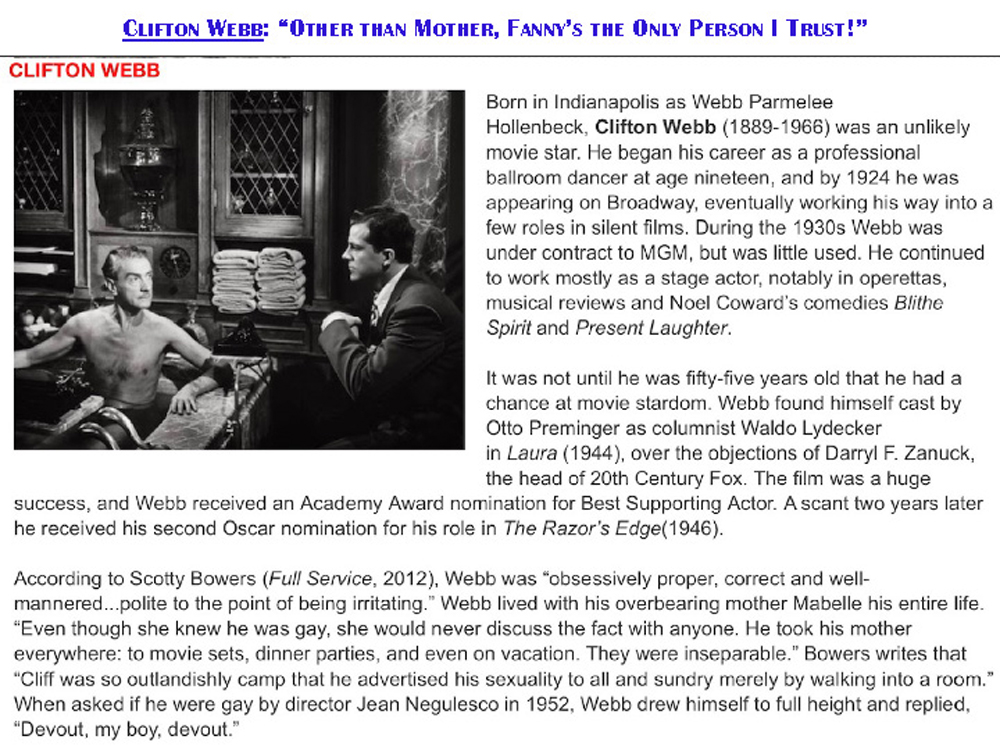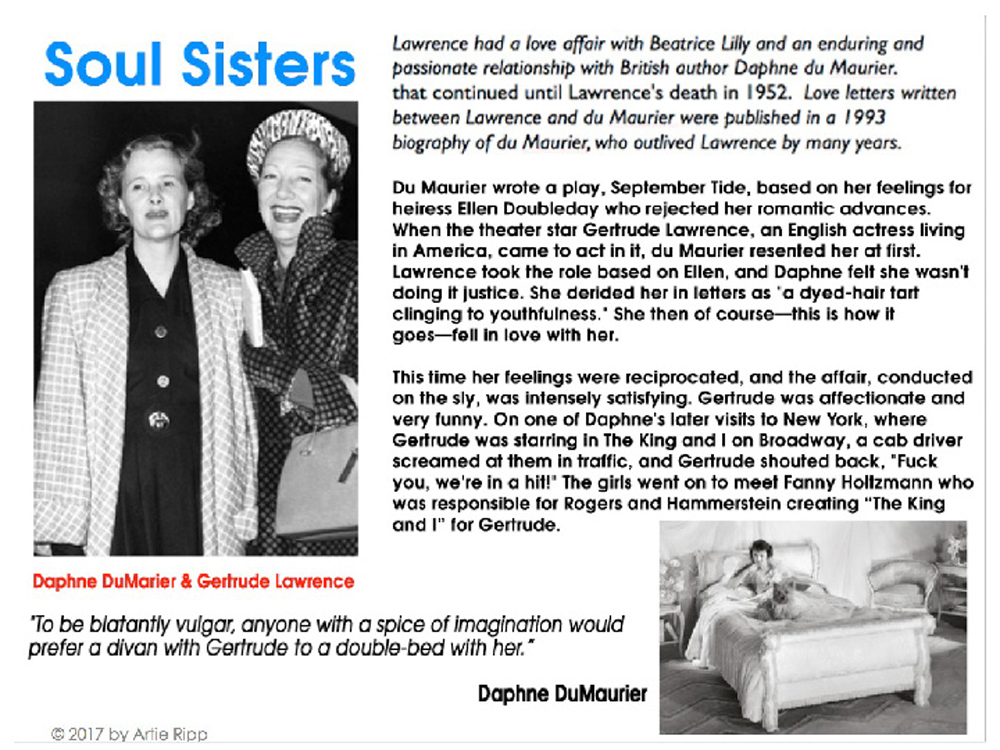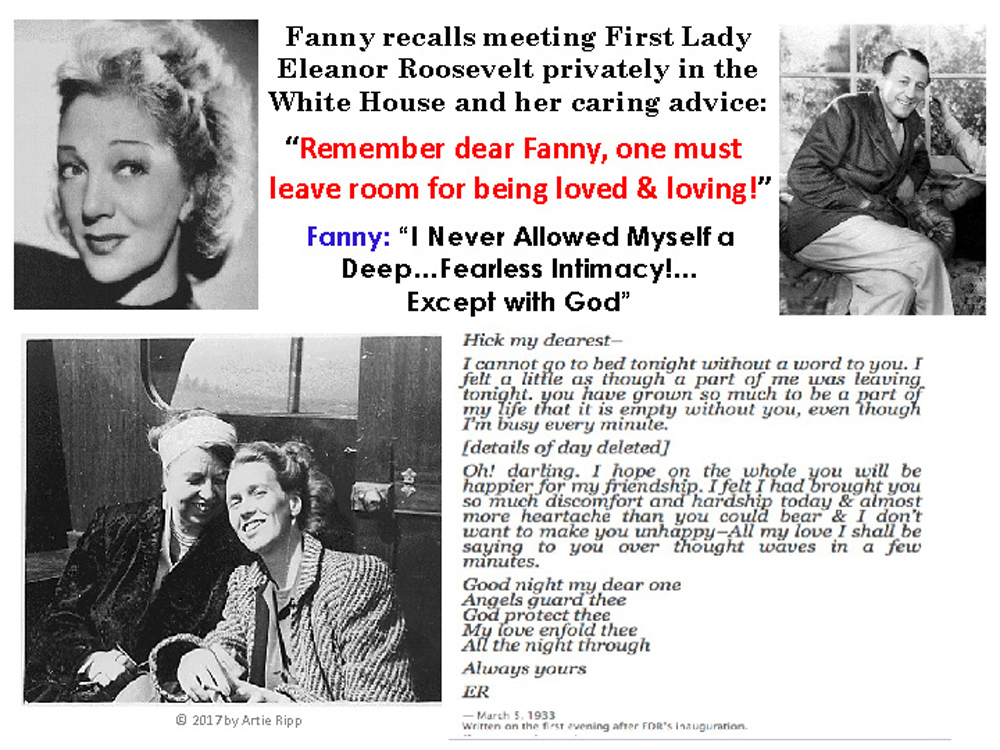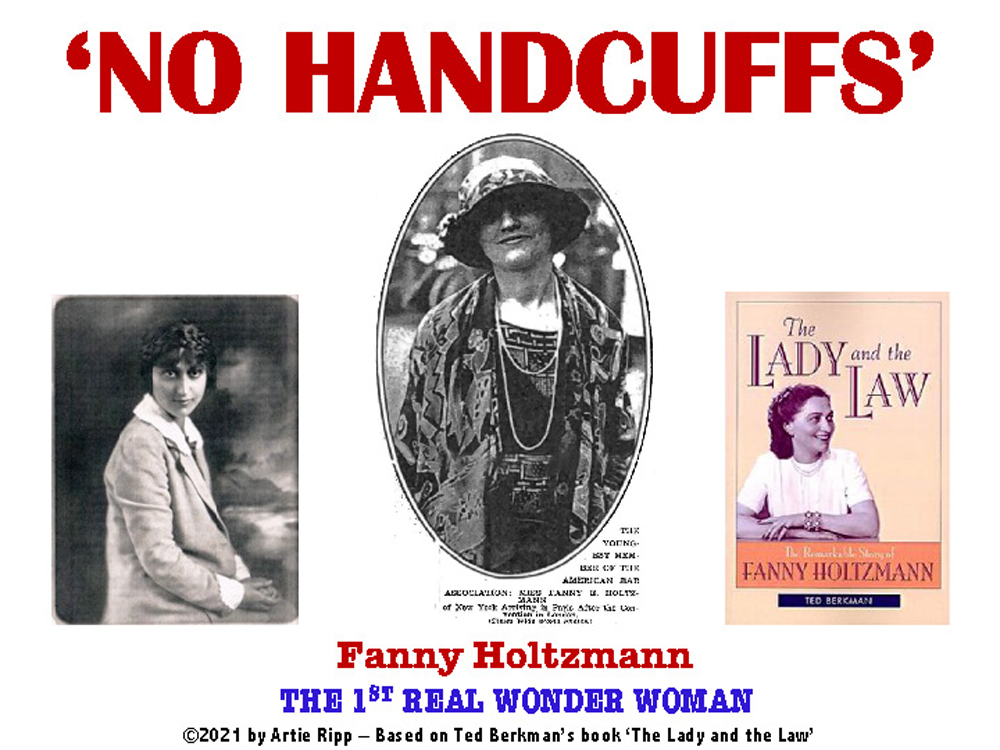NOEL COWARD
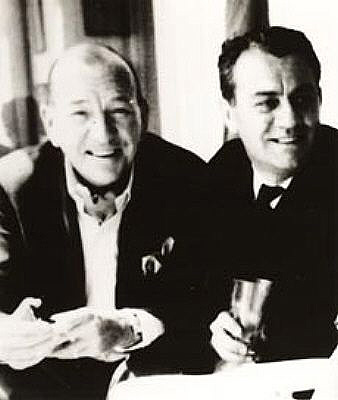 Noel Coward was a gay English actor, raconteur, playwright, director, painter, cabaret singer and composer of popular songs and stage music. His plays were adored by audiences, often reviled by critics, and his personal life was littered with scandal (he had a British royal boyfriend, Prince George, the Duke of Kent). His name became synonymous with sophistication, wit, and a world-weary sentimentality. The characters in his plays are usually wealthy, somewhat snobbish couples who express themselves with witty and brittle badinage. He was a public figure with whom every gay man should be familiar.
Noel Coward was a gay English actor, raconteur, playwright, director, painter, cabaret singer and composer of popular songs and stage music. His plays were adored by audiences, often reviled by critics, and his personal life was littered with scandal (he had a British royal boyfriend, Prince George, the Duke of Kent). His name became synonymous with sophistication, wit, and a world-weary sentimentality. The characters in his plays are usually wealthy, somewhat snobbish couples who express themselves with witty and brittle badinage. He was a public figure with whom every gay man should be familiar.
Note: Coward spelled his first name with the diaeresis (two dots) over the second vowel: Noël, but the press and many book publishers failed to follow suit; his name was printed as 'Noel' in The Times, The Observer and other contemporary newspapers and books, and that is the form I am using in this post.
To escape the crippling income taxes in post-war England, in 1948 Coward bought “Blue Harbour,” an eleven acre estate overlooking Port Maria on the north coast of Jamaica, near the home of Ian Fleming (of James Bond books fame). Coward enlarged the main house at Blue Harbour, added three guest cottages and a swimming pool and went on to host the first generation of jet-setting celebrities, including Sir Laurence Olivier, Sophia Loren, Elizabeth Taylor, Richard Burton, Alec Guinness, Joan Sutherland, Katherine Hepburn, Sean Connery, Mary Martin, Patricia Neal and Peter O'Toole, as well as his neighbors Errol Flynn and Ian Fleming. He knew everybody worth knowing.
In this photograph Coward is shown at home at Blue Harbour, Jamaica. He was an Olympic-class smoker all his life, and one of his affectations was the frequent use of a cigarette holder
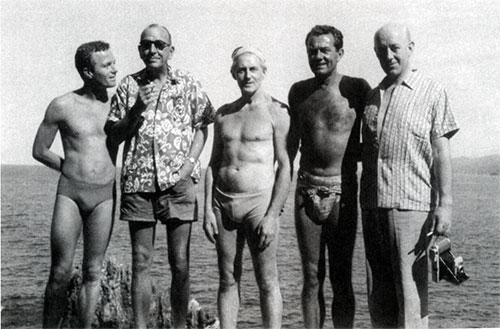 However, Coward needed the income from work, and he soon found he required isolation from his guests in order to write. Coward bought a 4-acre hilltop site high on a hill above Blue Harbour for $150 and built a simple white stucco structure with a swimming pool. The land originally belonged to the legendary Welsh privateer pirate Sir Henry Morgan, who looked after British interests in the Caribbean; Morgan was knighted and became Governor of Jamaica. Coward used Morgan's extant primitive 17th-century structure as servant quarters. The views from the hilltop were stunning (see photo below). His guests stayed at Blue Harbour down at the ocean, while Coward worked 1,200 feet above them at “Firefly,” the name of his private retreat. Today the three Blue Harbour villas are rented out as tourist accommodations.
However, Coward needed the income from work, and he soon found he required isolation from his guests in order to write. Coward bought a 4-acre hilltop site high on a hill above Blue Harbour for $150 and built a simple white stucco structure with a swimming pool. The land originally belonged to the legendary Welsh privateer pirate Sir Henry Morgan, who looked after British interests in the Caribbean; Morgan was knighted and became Governor of Jamaica. Coward used Morgan's extant primitive 17th-century structure as servant quarters. The views from the hilltop were stunning (see photo below). His guests stayed at Blue Harbour down at the ocean, while Coward worked 1,200 feet above them at “Firefly,” the name of his private retreat. Today the three Blue Harbour villas are rented out as tourist accommodations.
GEORGE, DUKE OF KENT
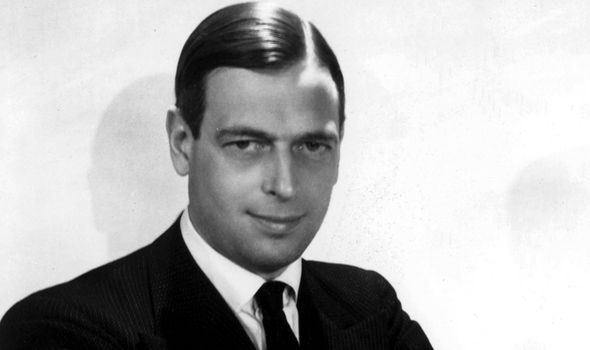 England's Prince George’s had a famous romance with Noël Coward, with whom he carried on a 19-year affair. In 1921, George saw Coward on stage in the West End. The young prince was immediately captivated by the famous wit and asked to be shown backstage. According to Christopher Warwick, “Gertrude Lawrence went back to her dressing room after the performance only to find Prince George trying on one of her wigs.” She introduced him to Coward and the two became lovers. Coward wasn’t discrete about his royal conquest and spoke about it openly. Author Michael Thornton published Noël Coward’s admission of his homosexual relationship with George in his 1985 book Royal Feud.
England's Prince George’s had a famous romance with Noël Coward, with whom he carried on a 19-year affair. In 1921, George saw Coward on stage in the West End. The young prince was immediately captivated by the famous wit and asked to be shown backstage. According to Christopher Warwick, “Gertrude Lawrence went back to her dressing room after the performance only to find Prince George trying on one of her wigs.” She introduced him to Coward and the two became lovers. Coward wasn’t discrete about his royal conquest and spoke about it openly. Author Michael Thornton published Noël Coward’s admission of his homosexual relationship with George in his 1985 book Royal Feud.
That George was interested in men was unremarkable – except that it was still illegal in Britain at the time – what was far more worrying was the complete lack of discretion. At one point, his father was forced to dispatch detectives to Paris to retrieve love letters George had sent to a male prostitute who was threatening to blackmail him. More letters, this time to Coward, are believed to have been stolen from Coward’s house in 1942.
On a trip to Kenya with his brother Edward, George became involved with society drug addict Kiki Preston, known as “the girl with the silver syringe”. By the time he returned to England, he was addicted to morphine and cocaine. His habit was fed by Jorge Ferrara, the bisexual son of the Argentine ambassador.
Edward, on discovering George’s addiction and involvement with Ferrara, kicked the Argentinian out of the country and packed George off to a house in the country to undergo a painful program of rehabilitation. Through the winter of 1929, George was nursed back to health.
IVOR NOVELLO
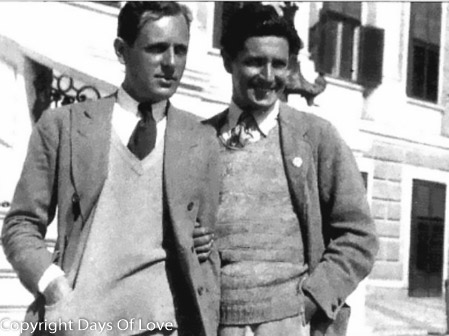 Born with the name David Ivor Davies in Wales, Ivor Novello was one of the most popular entertainers of the early twentieth century. He was a noted composer, singer, playwright, and actor. Most considered him a rival to Noel Coward, who was six years Novello's junior. Coward later wrote that he was envious of Novello’s handsome appearance and had sought to copy his glamorous, world-weary style. Coward and Novello went on to become good friends. In fact it was actor Robert (Bobbie) Andrews, Novello's life partner for 35 years, who introduced Novello to the young Noel Coward. Bobby Andrews and Novello were later to appear together in many of Novello's plays and musicals.
Born with the name David Ivor Davies in Wales, Ivor Novello was one of the most popular entertainers of the early twentieth century. He was a noted composer, singer, playwright, and actor. Most considered him a rival to Noel Coward, who was six years Novello's junior. Coward later wrote that he was envious of Novello’s handsome appearance and had sought to copy his glamorous, world-weary style. Coward and Novello went on to become good friends. In fact it was actor Robert (Bobbie) Andrews, Novello's life partner for 35 years, who introduced Novello to the young Noel Coward. Bobby Andrews and Novello were later to appear together in many of Novello's plays and musicals.
Novello’s first success was as a songwriter. At age 21 he wrote the music for Keep the Home Fires Burning, an immensely popular sentimental song of the WW I era that brought Novello money and fame.
In the 2002 film Gosford Park, the guests at a country house are entertained by Novello (played by Jeremy Northam), who performs on the piano. Six Novello songs were used in the soundtrack.
While Novello continued to write scores to songs, musicals and revues, he developed a career as an actor. His good looks, talent and suave style led to success on both stage and screen; he was considered England’s first great male silent film star, a British “Rudolph Valentino”. Like Coward, Novello enjoyed simultaneous careers in both Great Britain and the U.S. Novello earned enough money to buy a lavish, sprawling country house near Maidenhead in 1927. Named Redroofs, the property was the setting for extravagant, unconventional entertaining, often characterized by untempered homosexual excesses. Novello later bought a house in Jamaica where he and his partner Bobby Andrews went on holiday together.
FREDERICK OF PRUSSIA
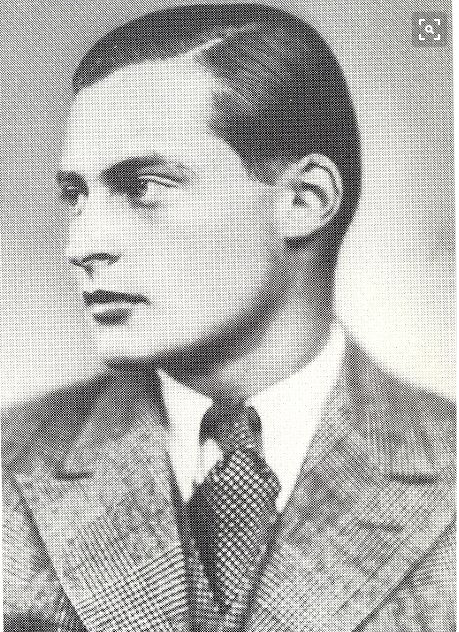 Prince Friedrich of Prussia. was a member of the German House of Hohenzollern, which never relinquished its claims to the throne of Prussia and the German Empire after they were abolished and replaced by the Weimar Republic in 1918. Educated at Cambridge University in England, Prince Friedrich settled in Britain in his late twenties just before war broke out in 1939. He became a British citizen, living in England as George Mansfield. For a time interned in Canada, he was able to return to England. However, in the 1950s he resumed his German titles, and to this day his descendants use the surname “von Preussen” (of Prussia).
Prince Friedrich of Prussia. was a member of the German House of Hohenzollern, which never relinquished its claims to the throne of Prussia and the German Empire after they were abolished and replaced by the Weimar Republic in 1918. Educated at Cambridge University in England, Prince Friedrich settled in Britain in his late twenties just before war broke out in 1939. He became a British citizen, living in England as George Mansfield. For a time interned in Canada, he was able to return to England. However, in the 1950s he resumed his German titles, and to this day his descendants use the surname “von Preussen” (of Prussia).
Prince Friedrich had tempestuous, painful affairs and encounters with handsome young men. He was also notoriously unstable and caused his family much suffering. Friedrich did not choose his friends wisely. He was a close friend of the infamous Sir Henry "Chips" Channon (photo at end of post), who was married to Lady Honor Guinness, the older sister of Prince Friedrich's long-suffering wife, Lady Brigid Guinness, who died in 1995. Why both these attractive, fabulously wealthy women each married a gay man is a mystery. Among others with whom he is known to have had affairs was the playwright Terence Rattigan, the Duke of Kent (who resided next door to Channon on Belgrave Square in London) and Prince Paul of Yugoslavia.
SOMERSET MAUGHAM
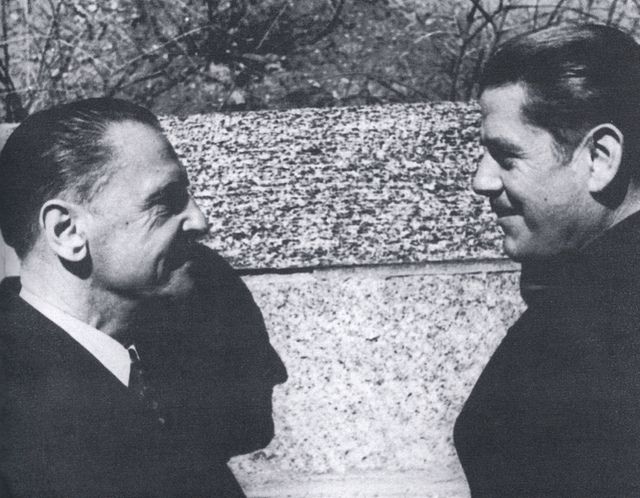 W. Somerset Maugham (1874-1965) was an English writer of novels, short stories and plays. His best-known novel is "Of Human Bondage" (1915), an early semi-autobiographical work which has never gone out of print since its initial publication. The female character in "Of Human Bondage" was actually based on a feckless young man who had humiliated the author all over Paris and London, breaking what there was of Maugham's heart.
W. Somerset Maugham (1874-1965) was an English writer of novels, short stories and plays. His best-known novel is "Of Human Bondage" (1915), an early semi-autobiographical work which has never gone out of print since its initial publication. The female character in "Of Human Bondage" was actually based on a feckless young man who had humiliated the author all over Paris and London, breaking what there was of Maugham's heart.
When an early literary effort sold out within a few weeks of publication in 1897, Maugham gave up medical studies at age twenty three to become a full-time writer. He became so successful that by the 1930s he was the highest paid writer in the English-speaking world, and his literary career lasted sixty-five years until his death at age 91.
Born at the British Embassy in Paris, his first language was French, and he was later teased for his bad English by his classmates at Canterbury. They also taunted him for his short stature, and Somerset ultimately developed a troubling stammer that stayed with him his entire life. He so hated his English school that he relocated to Germany, where he studied at Heidelberg University. While in Germany he had a sexual affair with John Ellington Brooks, an Englishman ten years his senior. Soon thereafter he returned to London to study medicine.
After switching to writing, he met with stupendous success. In 1907 “Willie,” as he was known to his friends, had four plays running simultaneously in London, and by the age of forty he was famous, having already published ten plays and ten novels. He was so prolific and successful throughout his career that he became extremely wealthy from his craft. Charming, suave and dignified, Willie always dressed in fine, tailored clothing of the highest quality, as he could well afford, and he was ferried about via chauffeur-driven limousine.
During the First World War, he served with the Red Cross in an ambulance corps, before being recruited into the British Secret Intelligence Service. While driving an ambulance in Flanders he met Gerald Haxton (1892-1944), eighteen years his junior. Haxton was a San Francisco native who became Maugham's companion and lover for thirty years. During and after the war, Somerset and Gerald traveled to India and Southeast Asia, and all of those experiences were reflected in his later writings. Willie lived for a time on the island of Capri, where many celebrated homosexuals pursued their careers and one another.
However, Maugham (photo at right) carefully avoided homosexual themes and gay characters in his works. As American novelist Glenway Wescott, pointed out, Willie's generation lived in mortal terror of the Oscar Wilde trial, which had taken place when Maugham was 21 years old. Before his relationship with Gerald, Maugham had fallen deeply in love with a man named Harry Philips, a failed Oxford divinity student. They were so paranoid of their relationship being exposed that they feared returning to England, living instead as a couple in Paris. Gerald Haxton had himself been deported from England in 1919 for being caught committing a homosexual act. Thus, in order to be together, Maugham had to travel outside England for Haxton's companionship. And travel they did.
It was not until Maugham became famous that he courted women. Although he had been brought up with the understanding that his homosexuality was a “defect,” his real reason for involvement with women was because a reputation as a gay man would have ruined his chances of continued success. He had a child, Liza, with his "mistress," Syrie Wellcome, whose husband sued for divorce over the illicit affair. Somerset did the noble thing and asked Syrie to marry him. But he had already met Gerald by this time, and when Somerset wavered on getting married, Syrie tried to kill herself. The couple married in New Jersey, shortly after her divorce in 1917, and she became a celebrated interior designer with a clientele culled from high society. Tragically, the pair had nothing in common in taste, temperament or sexual orientation. Although she loved being "Mrs. Somerset Maugham," she eventually agreed to a divorce in 1929, finding her husband's relationship with Gerald Haxton too difficult to cope with. The terms were expensive for Somerset – Syrie received the house in London with all its contents, a Rolls Royce and 2,400 pounds a year for her and 600 pounds a year for Liza. Syrie never remarried and died in 1955 at age 76.
On his many travels Somerset was always accompanied by Haxton (photo at left), whom Maugham regarded as indispensable to his success as a writer. Somerset was painfully shy and had to cope with his stammer, so the extrovert Haxton went out to gather material which the author converted to fiction. Haxton possessed what Maugham lacked. Haxton’s outwardness, amiability and popularity compensated for Maugham’s shyness, reserve and stiffness. Acquaintances were often astonished at how spoiled and controlling Haxton appeared, demanding that Maugham fetch drinks for him, cover his gambling debts and the like.
Haxton had a love affair with alcohol, and one drunken evening in 1930 he dove head-first into a half-empty swimming pool at a neighbor's house and cut his head open, dislocated his spine and broke a vertebrae, from which he recovered enough to walk about independently, although his posture was forever affected, and he could no longer turn his head. For all the trouble he was, Somerset's friends came to realize that Haxton was nevertheless exactly what Maugham desired. He virtually lit up inside whenever Haxton entered the room.
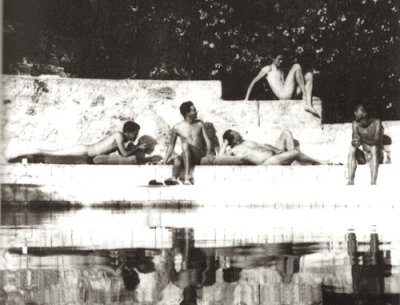 In 1926, three years prior to his divorce from Syrie, Somerset bought the 19th century Villa Mauresque, a 9 acre property on the French Riviera at Cap Ferrat, between Nice and Monaco. While Maugham described the French Riviera as "a sunny place for shady people," Cap Ferrat was his home for most of the rest of his life (his tax status stipulated that he could spend no more than 90 days a year in England). In 2005 the property was converted into a boutique hotel of eleven rooms and suites (below).
In 1926, three years prior to his divorce from Syrie, Somerset bought the 19th century Villa Mauresque, a 9 acre property on the French Riviera at Cap Ferrat, between Nice and Monaco. While Maugham described the French Riviera as "a sunny place for shady people," Cap Ferrat was his home for most of the rest of his life (his tax status stipulated that he could spend no more than 90 days a year in England). In 2005 the property was converted into a boutique hotel of eleven rooms and suites (below).
CLIFTON WEBB
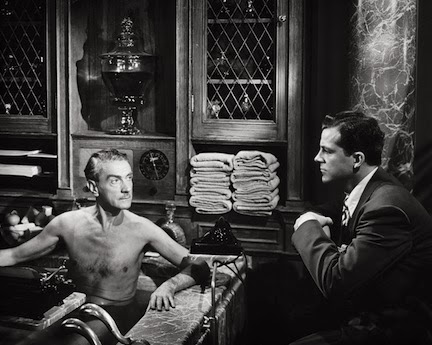 Born in Indianapolis as Webb Parmelee Hollenbeck, Clifton Webb (1889-1966) was an unlikely movie star. He began his career as a professional ballroom dancer at age nineteen, and by 1924 he was appearing on Broadway, eventually working his way into a few roles in silent films. During the 1930s Webb was under contract to MGM, but was little used. He continued to work mostly as a stage actor, notably in operettas, musical reviews and Noel Coward’s comedies Blithe Spirit and Present Laughter.
Born in Indianapolis as Webb Parmelee Hollenbeck, Clifton Webb (1889-1966) was an unlikely movie star. He began his career as a professional ballroom dancer at age nineteen, and by 1924 he was appearing on Broadway, eventually working his way into a few roles in silent films. During the 1930s Webb was under contract to MGM, but was little used. He continued to work mostly as a stage actor, notably in operettas, musical reviews and Noel Coward’s comedies Blithe Spirit and Present Laughter.
It was not until he was fifty-five years old that he had a chance at movie stardom. Webb found himself cast by Otto Preminger as columnist Waldo Lydecker in Laura (1944), over the objections of Darryl F. Zanuck, the head of 20th Century Fox. The film was a huge success, and Webb received an Academy Award nomination for Best Supporting Actor. A scant two years later he received his second Oscar nomination for his role in The Razor’s Edge(1946).
According to Scotty Bowers (Full Service, 2012), Webb was “obsessively proper, correct and well-mannered...polite to the point of being irritating.” Webb lived with his overbearing mother Mabelle his entire life. “Even though she knew he was gay, she would never discuss the fact with anyone. He took his mother everywhere: to movie sets, dinner parties, and even on vacation. They were inseparable.” Bowers writes that “Cliff was so outlandishly camp that he advertised his sexuality to all and sundry merely by walking into a room.” When asked if he were gay by director Jean Negulesco in 1952, Webb drew himself to full height and replied, “Devout, my boy, devout.”
